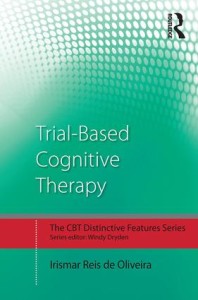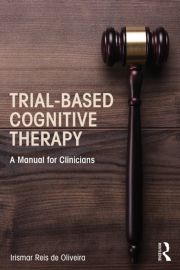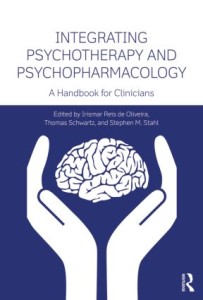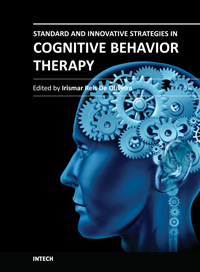Professor de Oliveira’s Books
Trial-Based Cognitive Therapy: Distinctive Features
 Trial-Based Cognitive Therapy (TBCT) is a new model of cognitive behaviour therapy (CBT) that organizes standard cognitive and behavioural techniques in a step-by-step fashion, making CBT more easily mastered by the new therapist, more easily understood by the patients, and simpler to be implemented, whilst still maintaining flexibility and CBT’s recognized effectiveness.
Trial-Based Cognitive Therapy (TBCT) is a new model of cognitive behaviour therapy (CBT) that organizes standard cognitive and behavioural techniques in a step-by-step fashion, making CBT more easily mastered by the new therapist, more easily understood by the patients, and simpler to be implemented, whilst still maintaining flexibility and CBT’s recognized effectiveness.
Dividing thirty key features into two parts: ‘Theory and Practice’, this concise book explores the principles of TBCT, explains the techniques developed throughout TBCT therapy to change dysfunctional cognitions, and provides a clear guide to the distinctive characteristics of TBCT.
Trial-Based Cognitive Therapy will be of interest to psychiatrists, psychologists, social workers, therapists, counsellors and other professionals working in the field of mental health, plus those wanting to learn CBT.
Trial-Based Cognitive Therapy is part of the Distinctive Features series, which asks leading practitioners and theorists of the main CBT therapies to highlight the main features of their particular developing approach. The series as a whole will be essential reading for psychotherapists, counsellors and psychologists of all orientations.
Trial-Based Cognitive Therapy: A Manual for Clinicians
 Trial-Based Cognitive Therapy presents a model that, although still inherently Beckian, organizes known cognitive and behavioral techniques in a step-by-step fashion in order to make cognitive therapy easier for the new therapist to learn, easier for patients to understand, and simpler to implement. Based on and backed up by a series of published studies, Trial-Based Cognitive Therapy lays out structured strategies for changing core beliefs about the self, and its clear, coherent, integrative conceptualization of psychopathology is presented as an easy-to-remember case-formulation model that is useful for both the therapist and the client. This book introduces a new approach, the Trial-Based Cognitive Therapy (TBCT), whose main technique, the Trial-Based Thought Record (TBTR), is a structured strategy to change core beliefs about the self and is presented as a law-centered analogy in which the therapist engages the client in a simulation of the judicial process. Perfect for psychotherapists at any level, Trial-Based Cognitive Therapy presents a balanced blend of theory advancement, scientific scrutiny of a new method, and practical application.
Trial-Based Cognitive Therapy presents a model that, although still inherently Beckian, organizes known cognitive and behavioral techniques in a step-by-step fashion in order to make cognitive therapy easier for the new therapist to learn, easier for patients to understand, and simpler to implement. Based on and backed up by a series of published studies, Trial-Based Cognitive Therapy lays out structured strategies for changing core beliefs about the self, and its clear, coherent, integrative conceptualization of psychopathology is presented as an easy-to-remember case-formulation model that is useful for both the therapist and the client. This book introduces a new approach, the Trial-Based Cognitive Therapy (TBCT), whose main technique, the Trial-Based Thought Record (TBTR), is a structured strategy to change core beliefs about the self and is presented as a law-centered analogy in which the therapist engages the client in a simulation of the judicial process. Perfect for psychotherapists at any level, Trial-Based Cognitive Therapy presents a balanced blend of theory advancement, scientific scrutiny of a new method, and practical application.
Integrating Psychotherapy and Psychopharmacology: A Handbook for Clinicians
 Integrating Psychotherapy and Psychopharmacology: A Handbook for Clinicians is a practical guide for the growing number of mental-health practitioners searching for information on treatments that combine psychopharmacology, psychotherapy, and psychosocial rehabilitation. Research shows that combined approaches are among the most effective ways to treat an increasing number of psychiatric disorders. However, though these combined treatments are becoming the everyday practice of psychiatrists, psychologists, and other mental-health professionals, identifying the right treatment plan can be notoriously difficult, and clinicians are often left scrambling to answer questions about how to design and customize their treatment strategies. In Integrating Psychotherapy and Psychopharmacology, readers will find these questions fully addressed and the answers explained, and they’ll come away from the book with a toolbox full of strategies for helping their patients improve symptoms, achieve remission, and stay well using a combination of drug and psychological treatments.
Integrating Psychotherapy and Psychopharmacology: A Handbook for Clinicians is a practical guide for the growing number of mental-health practitioners searching for information on treatments that combine psychopharmacology, psychotherapy, and psychosocial rehabilitation. Research shows that combined approaches are among the most effective ways to treat an increasing number of psychiatric disorders. However, though these combined treatments are becoming the everyday practice of psychiatrists, psychologists, and other mental-health professionals, identifying the right treatment plan can be notoriously difficult, and clinicians are often left scrambling to answer questions about how to design and customize their treatment strategies. In Integrating Psychotherapy and Psychopharmacology, readers will find these questions fully addressed and the answers explained, and they’ll come away from the book with a toolbox full of strategies for helping their patients improve symptoms, achieve remission, and stay well using a combination of drug and psychological treatments.
Standard and Innovative Strategies in Cognitive Behavior Therapy
 Cognitive-behavioral therapy (CBT) is the fastest growing and the best empirically validated psychotherapeutic approach. Written by international experts, this book intends to bring CBT to as many mental health professionals as possible. Section 1 introduces basic and conceptual aspects. The reader is informed on how to assess and restructure cognitions, focusing on automatic thoughts and underlying assumptions as well as the main techniques developed to modify core beliefs. Section 2 of this book covers the cognitive therapy of some important psychiatric disorders, providing reviews of the recent developments of CBT for depression, bipolar disorder and obsessive-compulsive disorder. It also provides the latest advances in the CBT for somatoform disorders as well as a new learning model of body dysmorphic disorder. Two chapters on addiction close this book, providing a thorough review of the recent phenomenon of Internet addiction and its treatment, concluding with the CBT for substance abuse.
Cognitive-behavioral therapy (CBT) is the fastest growing and the best empirically validated psychotherapeutic approach. Written by international experts, this book intends to bring CBT to as many mental health professionals as possible. Section 1 introduces basic and conceptual aspects. The reader is informed on how to assess and restructure cognitions, focusing on automatic thoughts and underlying assumptions as well as the main techniques developed to modify core beliefs. Section 2 of this book covers the cognitive therapy of some important psychiatric disorders, providing reviews of the recent developments of CBT for depression, bipolar disorder and obsessive-compulsive disorder. It also provides the latest advances in the CBT for somatoform disorders as well as a new learning model of body dysmorphic disorder. Two chapters on addiction close this book, providing a thorough review of the recent phenomenon of Internet addiction and its treatment, concluding with the CBT for substance abuse.
